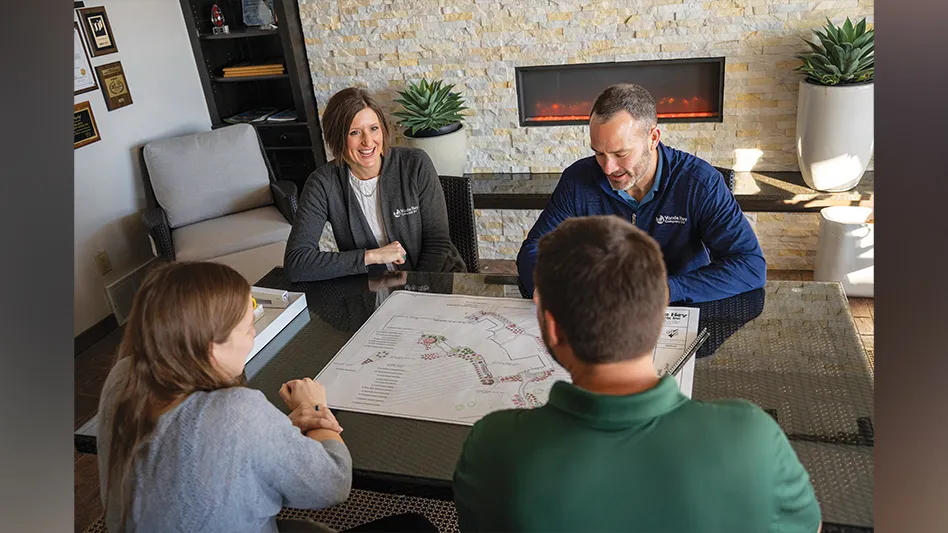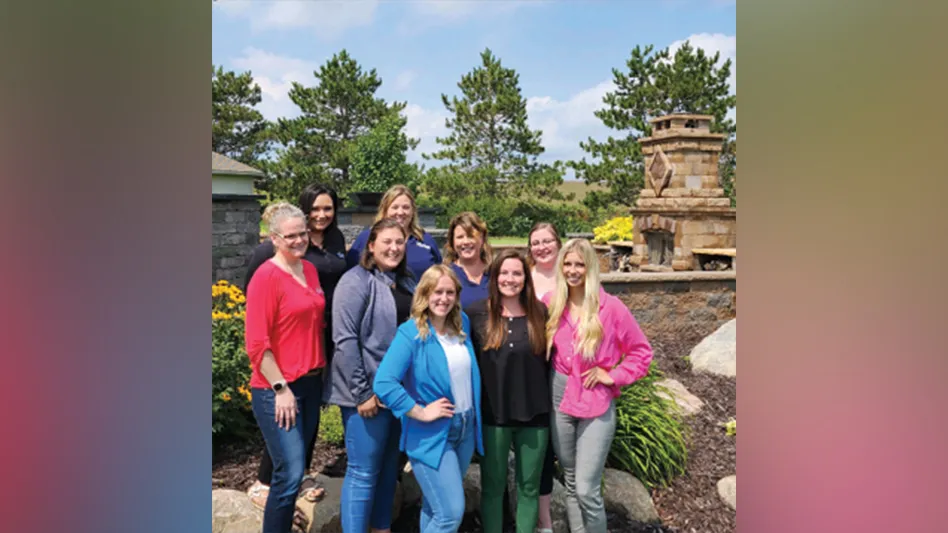
Private equity’s continued investment in the green industry has provided the resources for established companies to form under a new parent brand. We caught up with a handful of them to learn about their formation, discuss their M&A strategy and how to maintain a strong culture while expanding.
Trey Brock CEO, LMC Landscape Partners
“We’re not buying the fixer-upper businesses,” says CEO Trey Brock. “We’re looking for those with good momentum to help get them to the next level and partner with them.”
The company, which started in 2021 with an acquisition in Dallas, Texas, has quickly gone on to partner with several others and the family of brands now includes — LMC Landscape, Embark Tree Care, ALM Commercial Landscape, Owens Landscape and Cutters Edge Total Landscape Solutions.
“We’re looking for businesses that are at that growth hurdle. They need some capital infusion and a more robust sales and marketing plan. When we partnered with that first brand in Dallas, they were like the largest landscape company that no one had ever heard of,” Brock jokes. “That says a lot. They had just been growing organically, through word-of-mouth and as the business came, they just kept doing it. By plugging in some resources, some sales and marketing, some technology… it can quickly elevate a business. It’s not changing their approach to service, but kind of greasing some of the wheels and making it so your operations team can spend more time out in front of the client.”
This strategy allowed for LMC to achieve $87.5 million in 2023 revenue, securing them the No. 37 spot on the Top 100 List.
“2023 was really good to us,” Brock says. “We grew more than 20% organically on contract maintenance, which was over our goal. Now in 2024, we’re past 50% of our sales goal already. We’ve got that organic (growth) engine moving well.”
Last year was not only a banner year for LMC in terms of growth — but also for customer and employee retention.
“2023 brought us almost 93% customer retention, which was really good for us,” Brock says. “We had made some strategic decisions to move away from a few clients that just weren’t profitable or where we weren’t getting much extra enhancement work out of it.”
Brock says there’s plenty of benefits for businesses who partner with LMC, and most of those benefits are fueled by growth.
“I tell my people all the time, ‘Just grow and everything else will take care of itself,’ and that’s because growth creates so many other opportunities for people,” he says. “That’s what we’re really trying to get going. We want to keep the momentum on the growth side.”

Another advantage LMC has brought to the table is giving partners more data than they’ve ever had before. They’re giving them quality assistance in interpreting that data as well.
“We brought real-time data to them, and that’s something that they had to work so hard to get data before,” he notes. “Their systems were just older… it’s not about getting in there and cutting a bunch of things out of the business but giving your operators the power to be exposed to the data. It’ll provoke thought.”
This thought provocation helped companies walk away from some undesirable clients and make other moves to help fuel growth.
“When we first partnered with our Houston business, we were doing financial closes and had asked the team to run some reports for me on their bottom 20 — or worst 20 performing jobs they had,” Brock recalls. “This was a very mature, really well-run business and they never had been exposed to that. The conversation around those lowest performing jobs were crazy... as we got through them, they started to say things like ‘That’s a job we probably shouldn’t be doing.’”
Brock adds this is a very healthy way of thinking when it comes to business.
“Everyone wants to talk about the jobs that did fantastic all the time,” he says. “But we spend most of our time talking about the jobs that we’re trying to lift up.”
Whether it’s refining a list of clients or implementing a new software system, Brock says there’s bound to be pushback with change, but success can be had if you work through it properly.
“Obviously, you’ll have a few outliers that no matter what, even if you paint a wall a different color, change is horrible to them,” he says. “For the most part, positive change management has to be the way to approach it. When we partner with a company, I try to be very upfront about the things we’re going to change, and the things that are really going to influence their lives.
“It’s important to be able to feel their pain and understand what they must be thinking when somebody comes in and tells you a new system is coming down the pike,” Brock adds. “I lived through that hundreds of times. Our messaging is really important.”
Prior to joining LMC, Brock says he’s spent his entire career in the service business including landscape, janitorial and facility maintenance.
“I’ve earned a paycheck through front-line service workers my entire career,” he says. “It’s just the people. We don’t sell any products. We just have our people and that’s the foundation. I know what type of culture it takes to drive that.”
Brock suggests starting with changes that will improve the lives of employees and don’t take much added work or effort on the employee side.
“We come in quickly and capture the low-hanging fruit,” Brock notes. “Take benefits as an example — like a new 401K plan. If they had one — this one’s better. Or if they didn’t have one — they have one now. If you show them all of the good things the platform is bringing and then you start to talk about changes… most people see where you’re trying to go.”
Brock recalls one specific example of someone who was hesitant to change but ended up fully embracing a new way of doing things.
“We had a guy at one of our Huntsville, Alabama, businesses who really resisted the change early,” he says. “It got to the point where I thought he’s either going to find somewhere else to work, or we’re going to ask him to find somewhere else to work. But at our recent annual meeting, he was actually given our ‘Champion of Change’ award because he’s become such an ambassador of our productivity software.”
All good things (like change) take time. And that motto has correlated into the company’s acquisition strategy.

“We’re very targeted and very conservative,” Brock says of their M&A approach. “Our private equity group we work with is the oldest in the southeast. They have always been considered very founder friendly. They’re also very patient. We have a lot longer hold time then some of the others.”
Brock emphasizes that LMC truly seeks out partnerships.
“We’re not looking for the founder who wants to exit in three months because he’s tired of running the business,” he explains. “There’s a lot of red flags that come with that. We’re looking for a founder who doesn’t have the capital or that the business has reached the size where it’s outside the scope of their understanding.”
Brock says some key things to look for are solid growth year-to-year and a superb reputation.
He adds LMC is hoping to continue acquiring companies across the country.
“We’d love to be in Tennessee, Georgia, the Carolinas — that’s really our primary target area,” Brock says. “We don’t want to get into snow revenue, because that’s really hard to predict.
“I had a lot of snow in my facilities days, and it would make my year some years and ruin my year some years trying to predict what was going to happen with that kind of revenue.”
Jon Clift CEO, TurfMasters Brands

When Jon Clift was growing up in a rural Midwestern town, he didn’t necessarily envision himself working in the green industry.
“I’m originally from Missouri — and grew up in a really small-town farming community,” he says. “I went on to get my degree in psychology from the University of Missouri.”
From there, Clift worked for a national lawn care company for over two decades.
So, some may be curious as to how a degree in psychology can help to effectively lead a lawn care or landscaping company, but for Clift it gets to the core of the company — its people.
“It’s weird how things happen,” he laughs. “But this business is all about people. There’s always conflict, always drama, always things that need arbitrated… so those skills still apply.”
Clift recalls in April of 2022 he began having conversations with Andy Kadrich, founder of Turf Masters, about Clift’s future. And meanwhile, there was some private equity interest in Kadrich’s company.
“In April of 2022, Andy and Turf Masters teamed up, and eventually partnered, with CenterOak Private Equity out of Dallas, Texas. That started forming the platform we have now called Turf Masters Brands,” Clift says. “I started as the COO in June 2022. Since then, we have been going out and partnering with other small- to mid-size lawn care companies primarily throughout the Southeast. We have 15 brands now and serve just over 180,000 customers.”
Clift moved into the role of CEO at the beginning of 2024.
As a company, Turf Masters Brands garnered more than $109 million in 2023 revenue and landed at No. 26 on this year’s Top 100 list.
“But this business is all about people. There’s always conflict, always drama, always things that need arbitrated… so those skills still apply.” — Jon Clift, CEO of TurfMasters Brands
“2023 was a great year,” Clift says. “We partnered with five new companies.”
As an added bright spot to all that growth, Clift mentioned that the company also had strong customer retention over that time period.
“That’s something we take a lot of pride in when we have most of our brands with over 85% retention,” he says. “(Retention) has continued to be very important. Most of these small lawn care companies have a real focus in their individual city or market on taking care of their customers and making sure they’re committed to quality — and those are really the values that are important to us as Turf Masters Brands.”
Clift says he attributes the company’s high retention primarily to the way Turf Masters handles its acquisition.
“We don’t go in and ask people to change their name,” he says. “We keep those legacy brands in place in their markets. We want to continue to build on the legacy already built. It wouldn’t make any sense to change that if a company has worked sometimes 30 years to be recognized.”
This decision harkens back to the company’s core values and what they are looking for in prospective partners, according to Clift.
“Our main approach is with our values,” he says. “There have been companies we weren’t interested in buying because we didn’t think they were a culture fit. We didn’t think the values completely aligned and it’d be too much of a project. It’s one thing to go through the exercise of just rolling out numbers, but we’re looking for those people who have built a strong brand and who really care about their people.
“That’s got to be one of the toughest things for people trying to sell — just making sure that the people they call family and they’ve worked with for years will be in good hands,” Clift adds. “On one hand they want the payday, but they also want to know the reputation of the brand and that their people are being taken care of will continue.”
Clift adds that the recent hirings of a VP of sales and a VP of marketing have also really helped newly acquired partners take their business to the next level.
“She’s really helping these brands, who may or may not have been good at marketing in the past, to improve,” Clift says of Jill Kornegay, Turf Master’s VP of marketing.
Clift notes Turf Masters isn’t overly aggressive with its acquisition approach — adding that it’s a blend of nurturing years-long relationships within the industry and seeking out new prospects.
“There are a lot of relationships that we have so we’re constantly keeping tabs on how everyone is doing and then through CenterOak, we’re also sending out letters and making phone calls and trying to find those situations where someone has built up a strong business and they’re interested in their exit strategy,” he says.
Turf Masters’ strong growth should continue in 2024, and Clift says he’s optimistic.
“This year has started out really well,” he notes. “The weather has been a little bit behind schedule, but we’re growing the customer count and we’re up and ready to go. I think we’ve had 5% growth already in our customer count this first quarter and we expect that to end the year somewhere around 10% customer count growth.”
And the company isn’t shying away from more acquisitions either. Clift says they have their eyes set on expansion. Currently, Turf Masters Brands (which include Might Green, Loyalty Lawn Care, Fairway Green and others) is in 11 states including Georgia, Florida, North Carolina, South Carolina, Texas and Colorado.
“The way we look at it is the Southeast is a natural fit given our current footprint,” Clift says. “We’re not closed off to other parts of the country though. If it was a great brand and a great company that was a good culture fit… then that’d be an area we’d look to expand to.”
Nate Carlson, CEO, SunWorks Landscape Partners

SunWorks Landscape Partners first started in the summer of 2021 with an acquisition of a company in Denver, Colorado. CEO Nate Carlson says it’s been steady growth ever since.
“In 2022, we did three acquisitions and that brought us from Colorado down to Texas and also out to Arizona,” Carlson says. “Last year, we did four more acquisitions including one more in Texas and three in central Florida. Most of our growth was in 2022 and 2023 to get us to where we are today.”
Now, SunWorks has seven partner companies across those states and nearly 900 employees.

“2023 was a great year for us,” he says. “We had wanted to expand in the Southeast next and were looking for opportunities to do that… fortunately those came into fruition. They were excited about the opportunity to partner with SunWorks.”
In addition to those new acquisitions, the company also earned double-digit organic growth in existing markets. Its partners include ColoradoScapes, Top Notch Lawn Care, LMI Landscapes and others.
For the year, SunWorks finished 2023 with $93 million in 2023 revenue, which puts them at No. 33 on this year’s Top 100 List.
Carlson says the company is looking forward to an even better year in 2024.
“We’re off to a good start with strong revenue growth across all of our businesses in the first quarter,” he says. “We’re continuing to look for new expansion opportunities as well.”
According to Carlson, SunWorks is looking for customer-oriented teams who take pride in doing high-quality commercial landscape work.
“We tend to partner with folks who want the help. There’s no smoke and mirrors here. We go into each transaction very aligned with management about their vision for the business and our vision for the business.” — Nate Carlson, CEO of SunWorks Landscape Partners
“I wouldn’t say we’re particularly aggressive,” he says of their acquisition approach. “We’re really focused on finding the right fit. For us, that means we can be a valuable partner to someone who has been running their business for a long time and has built a successful business and it’s time for either that person to start to take some chips off the table and think about retirement, or maybe they’ve taken the business as far as they want to go.”
More often than not, Carlson says their prospective partners come in looking for an exit strategy.

“Maybe the business was too large for someone else in the business to buy them out, so they’re looking for an outside buyer who can purchase the company and allow them to help lead the company into its next chapter,” he says. “For a lot of them, they started their business in their teens or in college, and it’s the most significant professional experience of their life. Having spent many years as an entrepreneur, they’re looking for some context and ideas and thought partnership from a larger organization.”
Regardless of if the former owner is looking to retire or stay on board, Carlson says another important piece of the puzzle is a willingness to change.
Although SunWorks doesn’t rebrand its acquisitions, Carlson says the companies have to be willing to make adjustments.
“We don’t want to be forcing change where it’s not wanted,” he notes. “We tend to partner with folks who want the help. There’s no smoke and mirrors here. We go into each transaction very aligned with management about their vision for the business and our vision for the business. Long before we get to closing, we want to stack hands on what the business needs, its next chapter and how we can help provide that.”
And there’s plenty of help SunWorks can provide its partner brands — whether its better buying power and cost savings for materials, equipment, technology, vehicles, insurance and more — or assistance solving some of the green industry’s biggest challenges.
“We’re looking for opportunities where we can add value, particularly on the talent and systems side,” he says. “Those are probably the things that sellers tell us they want the most help with — whether that’s upgrading their financial systems, implementing software and other tools that are out there.”
Carlson says the SunWorks brands also have access to their structured training and onboarding programs.

“With talent acquisition and training and development, a growing business always needs people to help fuel that growth,” he says. “Whether it’s preparing people for internal promotions and helping them into the next role and be successful or bringing talent into a business to fill vacancies and bringing people in to expand.”
For small companies under $10 million in revenue, Carlson says labor and retention can be the biggest hurdles to overcome.
“The green industry is a very fragmented industry where most of the companies in this industry are relatively small,” he says. “For companies of that size, it can be really difficult to have the bandwidth to build the kind of training and development programs for employees in order to make the company the most attractive place to work.”
That’s where SunWorks comes in, and Carlson says it’s been paying off tenfold for the company’s partners.
Another common complaint SunWorks hears often is the rising prices of everything it takes to run a business.

“The cost structure in our industry has shifted pretty dramatically over the past several years since COVID,” Carlson says. “We’ve seen everything from materials to fuel to labor costs increase dramatically. And at the same time, a lot of customers have budget constraints and are limited in how much they can spend. That’s been a pain point for a lot of companies in the industry… We help our partners think through contract structure, pricing, what segments of the market to focus on and things of that nature.”
For business owners who partner with SunWorks, everything comes full circle, much like Carlson explains his path back to the green industry.
“I like to joke with folks that I’ve come full circle in life,” he says. “My first job, like most people in this industry, was pushing a lawn mower,” he says.
Following college, Carlson joined the Marine Corps and served his country for eight years. After that, he worked for a large energy company before wishing to return to landscaping and set out for a business to buy.

Jump forward a few businesses and several million dollars later, what’s next for Carlson and SunWorks? He says the company is ready to expand even further.
“There’s still an enormous amount of opportunity in all of our markets and the markets adjacent to our existing brands, so we want to continue to expand organically there,” he says. “We will likely continue to do some tuck-in acquisitions in those states. Also, we want to continue to grow business in additional states as well. We’re focused on the southern half of the country or the ‘evergreen’ markets in particular. Our big focus this year is in the Southeast.”
Billy McEnery CEO, Green Garden Group

Born and raised in the Chicagoland area, Billy McEnery really wanted an opportunity to dive back into entrepreneurship and the process of growing a business.
He wasn’t set on one particular industry; he’s served as an executive for a variety of companies and he’s worked on Wall Street. But McEnery just wanted to dive back into a business with evergreen services, returning revenue and long-term clients.
“A lot of those attributes are found in the green industry,” he says. “At the end of the day, I found (all those attributes) attractive.”
McEnery says it’s still a learning curve having only been in the industry for two years. But since Bosworth Capital Partners purchased his landscaping company and asked him to lead future integration and acquisition efforts, McEnery has relished the opportunity to learn.
Green Garden Group is up to four branches that cover the entire Chicagoland area. The company amassed $45 million in 2023 revenue and ranked No. 72 on Lawn & Landscape’s Top 100 list this year.
They began with their first acquisition in 2021, added three businesses in 2022 and tacked on another last year. Each company under the Green Garden Group still operates under its own brand.
McEnery says Green Garden Group has adopted a hybrid strategy of the two major models he’s seen in the green industry. He says some companies will buy businesses all over the nation without as much integration between them, but others will acquire companies and all adopt the same unified branding.
McEnery says that at Green Garden Group, they’re more focused on unifying the back offices but encouraging companies to retain their brands that clients grew to know. Green Garden Group wants office employees to adopt one corporate structure and similar processes for things like fleet management and IT.
“They have their own management and sales teams — we let them drive the bus from that perspective,” McEnery says. “But there’s obviously cross pollination.”
That cross pollination can be difficult, McEnery admits. “I think in landscaping, there’s 18 different ways to solve the problem and everyone’s reached the solution a little bit differently,” he says.
To help unify these approaches, McEnery says they’ll run a monthly meeting amongst all managers. He meets with an individual manager once every other week. They haven’t gotten around to an all-exec offsite meeting yet, but McEnery thinks that’s coming, too.
“I do like the natural conversations that I’ve seen,” he says. “We’ll swap work, sub out internally to each other.”
Finding the right companies to partner with starts and ends with getting a feel for their core values.
Green Garden Group aims to partner with businesses that focus on maintenance and enhancements, but also with companies that have quality employees. He says the workers often mirror the core values of the business leadership.
“Everyone we’ve bought has been very founder driven, owned and led,” McEnery says. “Although we’re owned by an investment group, we’re all Midwest people. We try to be as down to earth as possible.”
McEnery also says he’s helped his employees feel safe to bring up challenges and new solutions. As Green Garden Group tried to sell some of its design/build work, McEnery has learned that it’s important to have a strong social media presence that’s smooth and engaging for the clients.
A salesman was in front of a client who showed off pictures from one of Green Garden Group’s competitors. The salesman brought the idea to McEnery, who went out and contracted someone to boost their social media presence.
Another instance where employees brought up new ideas was trying to branch into services like simple add-ons. Last summer, Green Garden Group tacked on mosquito abatement and it was a hit.
“I mean, we’re looking at every aspect of the business, whether it’s purchasing equipment, fuel, HR, the hiring experience — it’s all part of that integration experience,” McEnery says. “Ultimately, it’s about preserving and empowering the team that’s already here. It’s been fun. It’s been a lot of moving pieces over a short period of time, but we’re excited for 2024.”
Jeffrey Domenick CEO, KEYSERV
Jeffrey Domenick learned one major thing from studying landscape architecture in college — that he wasn’t a very good landscape architect at all.
“I’ve been in the industry my entire career,” says Domenick, who’s traversed the nation working various landscaping jobs in all sorts of segments of the industry. He grew up in Central Pennsylvania and grew up mowing lawns and working for landscape contractors. “I enjoy the idea of putting a design together, but I didn’t enjoy being in an office all day,” he says.
So, he migrated at all sorts of stops every two or three years, working anywhere from Hilton Head to Florida to the Mountain West. Domenick also worked all sorts of jobs, too, on both the manufacturing/supply side to the landscaping side. When COVID-19 hit and he was 2,500 miles away from some of his family, Domenick wanted something different. That’s when he started pitching to private equity companies.
“I always had this idea that the landscape services space was very fragmented,” he says. “I started shopping (this idea) to private equity groups. I was just amazed with how much interest there was.”
Domenick opted to roll with Kidd & Company, which boosted Domenick’s vision to create KeyServ. In just three years of operation, KeyServ has blossomed into a nearly $40 million company that’s poised to grow again next year. The company has doubled in size in each of its years in operation. It ranks No. 88 on Lawn & Landscape’s Top 100 list.
Domenick credits this quick rise to two primary factors — seven acquisitions and double-digit organic growth. It doesn’t hurt that it’s so much fun, either.
“I just really like the industry; I like everything about it,” he says. “I think people who work in the landscape industry, they do it for a very specific reason. They really enjoy what they do.”
That philosophy of enjoying the industry extends to the hiring and M&A processes, he adds. KeyServ has acquired companies like DalaCasa, which focuses on lawn care and maintenance, and companies like Blue Bell, which is a full-service company that has also specialized in landscape construction, design/build and pool enhancements. KeyServ has also added Imagine Outdoor Lighting, Tesh-Troxler Landscapes & Designs and Quality Creative Landscaping. The acquisitions have helped diversify KeyServ.
Domenick says when they decide to add on a new service or need a new position, KeyServ always looks internally among its family of brands first, creating more of a career ladder within the company so employees are excited to stay.
“I prefer to hire at the lowest level of the organization and promote those guys through,” he says. “When you know someone meets the culture of the company and they’ve got some ambition, giving them an opportunity to go run keeps them engaged.”
Of course, that’s not to suggest mergers and acquisitions are an easy process. Domenick says there’s a difference between integration and assimilation. Integration includes unifying the two companies on how to run software and the financials. Then there’s assimilation, which is getting the new team adjusted to how KeyServ operates and learning from the acquired company’s “secret sauce” as well. It’s a process that Domenick says involves very little ego.
“The first 90 to 120 days, very little, if anything, changes,” Domenick says. “What we do is called ‘watching the game film.’ We really just try to understand what it is that makes them tick.
“When you do an acquisition, and that company’s got a need, maybe we can take a strong crew leader and make them an account manager that that company didn’t have before,” he adds.
KeyServ’s organic growth has also stemmed from a refocused approach. Yes, they lucked into some inflationary growth in 2022 industry-wide, which is right when they picked up the business — Domenick readily admits that much. But they’re also aiming to be closer to 70% residential and 30% commercial, and though they’re not quite there, they’re nearing that mark.
Domenick says that as they add more companies to KeyServ, there’s less subbing out work, bringing those services in house to do more lines of business.
“A lot of that growth gives us increased gross margin,” he says. “We’ve done a good job of becoming that one-stop-shop for customers, and that makes us sticky.”


Explore the May 2024 Issue
Check out more from this issue and find you next story to read.
Latest from Lawn & Landscape
- Landscape Workshop acquires Cut Above Enterprises
- Scythe debuts new generation of M.52
- Ruppert promotes Anderson to director of talent acquisition
- Man in the mirror
- EverSmith Brands appoints Ken Hutcheson as its new CEO
- Manitou unveils new Woodcracker tree saw with grapple
- LandCare promotes Burnett to chief people officer
- David J. Frank Landscape celebrates 65th anniversary with groundbreaking






